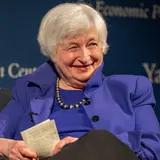Federal Reserve Announces Main Street Lending Program
Access our live “financial-intervention” tracker, which is a single point-of-entry on the YPFS website to keep up with financial-crisis fighting interventions by central banks, fiscal authorities, and international organizations here.
On April 9, the Federal Reserve announced the details of its new Main Street Lending Program to purchase up to $600 billion in small business loans.
The program consists of the Main Street New Loan Facility (MSNLF) and the Main Street Expanded Loan Facility (MSELF). The Fed established the facilities under its emergency lending authority under Section 13(3) of the Federal Reserve Act and approved by the Treasury Secretary. In support of these facilities, the Treasury will make a $75 billion equity investment in a special purpose vehicle (SPV) using funds appropriated to the Exchange Stabilization Fund under the CARES Act. The Fed will in turn provide recourse loans to the SPV. The SPV will purchase a 95% participation in eligible loans while lenders retain the remaining 5%. The SPV will purchase up to $600 billion in loans.
Eligible lenders include United States insured depository institutions, bank holding companies, and saving and loan holding companies. Lenders may originate new loans (MSNLF) or expand the size of existing loans to eligible businesses (MSELF). Both facilities have a minimum loan size of $1 million.
Under the MSNLF, the maximum size is the lesser of either $25 million or the amount that does not bring the borrower’s total existing debt to four times its 2019 EBITDA (EBITDA measures a company’s earnings before interest, tax, depreciation, and amortization). Under the MSELF, the maximum loan size is equal to the lesser of $150 million, 30% of the borrower’s existing outstanding and committed but undrawn debt, or the amount that does not bring the borrower’s total existing debt to six times its 2019 EBITDA.
Lenders can set loan interest rates at the Secured Overnight Financing Rate (SOFR) plus 250-400 basis points. Loans will have a maturity of four years. Principal and interest payments can be deferred for one year. Loans purchased pursuant to the MSNLF must be unsecured, while those purchased under the MSELF may be collateralized.
Businesses with up to 10,000 employees or up to $2.5 billion of revenue in 2019 are eligible for loans under the program. Eligible businesses must be organized in the United States with significant operations and a majority of their employees in the country. Businesses eligible to receive forgivable loans under the Paycheck Protection Program through the Small Business Administration (SBA) can also participate. A borrower cannot participate in both the program and the Primary Market Corporate Credit Facility (PMCCF). Borrowers also cannot utilize both the MSNLF and the MSELF.
Eligible borrowers must commit to making “reasonable efforts” to maintain payroll and retain employees over the life of the loan. Borrowers must follow compensation, stock repurchase, and dividend restrictions set forth in the CARES Act for direct loan programs. Businesses with conflicts of interest, as defined in Section 4019(b) of the CARES Act, cannot participate. Borrowing under the program cannot be used to pay off existing debt, including pre-existing portions of eligible loans that are extended under the MSELF.
The Federal Reserve defines fees for participating in the facility, as well as origination and servicing. Under the MSNLF, eligible lenders will pay the SPV a facility fee of 100 basis points of the principal amount of the loan participation purchased by the SPV, though the lender can require the borrower to pay. Borrowers pay an origination fee of 100 basis points of the principal for loans under the MSNLF. Under the MSELF, borrowers will pay a fee of 100 basis points on the increase in principal under the expanded loan. The SPV will pay lenders 25 basis points of its participation in the principal amount per year for loan servicing under both facilities.
The program is set to purchase loans through September 30, though Chair Jerome Powell, in an interview, said that the end date is tentative and will be extended if necessary, depending on the state of the economy. The Federal Reserve Board of Governors and the Treasury Department will be required to approve a proposed extension.



